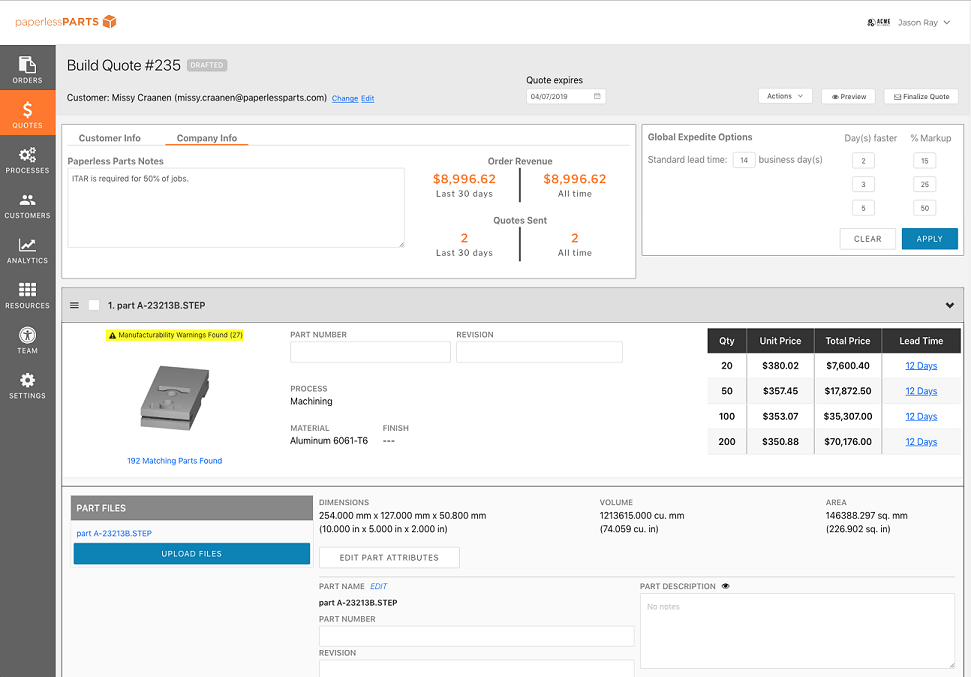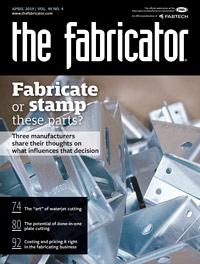Editor-in-Chief
- FMA
- The Fabricator
- FABTECH
- Canadian Metalworking
Categories
- Additive Manufacturing
- Aluminum Welding
- Arc Welding
- Assembly and Joining
- Automation and Robotics
- Bending and Forming
- Consumables
- Cutting and Weld Prep
- Electric Vehicles
- En Español
- Finishing
- Hydroforming
- Laser Cutting
- Laser Welding
- Machining
- Manufacturing Software
- Materials Handling
- Metals/Materials
- Oxyfuel Cutting
- Plasma Cutting
- Power Tools
- Punching and Other Holemaking
- Roll Forming
- Safety
- Sawing
- Shearing
- Shop Management
- Testing and Measuring
- Tube and Pipe Fabrication
- Tube and Pipe Production
- Waterjet Cutting
Industry Directory
Webcasts
Podcasts
FAB 40
Advertise
Subscribe
Account Login
Search
Technology Spotlight: A plan for better quoting in metal fabrication
Developer of a new quote-to-order platform believes job shops can exert more supply chain power with his creation
- By Dan Davis
- April 2, 2019
- Article
- Shop Management

Pricing quotes generated from the Paperless Parts platform can include multiple options for quantities and delivery lead times, ensuring that the purchaser knows all the choices available.
For someone who hasn’t run a machine shop, Jason Ray knows a lot about how machine shops are run.
At one time he was interested in purchasing one. He had an understanding of supply chains, and he liked the idea of making things. When he started investigating potential takeover targets, however, he didn’t like what he learned.
“It was a real shock,” Ray said. “I would have interest in possible ownership of a business, but I would then try to figure out how to fill the shoes of the owner with more than 25 years of experience who knows how to manage the quote-to-order process, how the company priced parts, and how to keep customers happy. The only information I would have about what customers have paid in the past would be paper records in a file folder.”
That led Ray to change his course in life. Instead of owning a job shop, he wanted to build a software tool that could solve the very problem that made him hesitant to become an owner. He wanted to create a modernized approach to quoting, arguably one of the most important processes for a metal fabricating company.
Motivation to Make a Change
Ray began his career in the U.S. Navy as a Supply Corps officer in January 2009. That’s where his education began in the field of logistics.
Soon afterward he handled logistics management for a minesweeper. That’s when he started to ask questions that got the attention of superiors.
“We were supporting platforms that were supposed to be retired for five years before I got there, and I spent almost three years banging my head against the wall, trying to figure out how we can support these platforms,” Ray recounted. “That’s when I really started to look at the parts we were buying, and asked, ‘Why aren’t we making this stuff?’”
That’s when he discovered additive manufacturing. Although he wasn’t an engineer, he had a real intellectual curiosity about how this technology could change the way the U.S. Navy procured parts. It also got him thinking about the way that advanced manufacturing technologies can transform traditional ways of doing business.
In April 2014 Ray left the sea-faring life and dropped anchor in Arlington, Va. As a naval reservist, he was asked to lead the U.S. Navy’s additive and advanced manufacturing efforts from the Pentagon.
That position lasted until the end of 2016, and Ray was ready for his next challenge, which he thought might involve ownership of a machine shop. His knowledge of supply chains and advanced manufacturing would be a “lethal combination,” he said.
He even sought out mentors. He found a very important one in Jay Jacobs, the founder of Rapid Manufacturing in Nashua, N.H., a fabricating business that built its success on the ability to quote and produce prototypes in very short time frames, often in days. (Jacobs sold Rapid to Protolabs, Maple Plain, Minn., in November 2017. Rapid was the winner of The FABRICATOR’s 2018 Industry Award and is highlighted in the publication’s February 2019 edition.)
As he tried to figure out what kind of machine shop he wanted to purchase, he couldn’t get past the fact that they all had a similar problem: data management. In visiting more than 100 shops, he encountered shortcomings of all kinds: job information kept in basic software programs such as QuickBooks, enterprise resource planning software capabilities that were barely being used, and the case of paper notes kept in old file cabinets. He might be able to buy a business, but he wasn’t going to have easy access to the data that was integral to building that business.
He shifted gears then. He went back to his potential investors and shared his reservations. But he also shared his observations. That’s where Ray found a sympathetic ear.
“Jay Jacobs has had this vision for a very long time. He has long believed that component purchasing was going to be driven by instant pricing, whether in a marketplace or some other conduit. At some point all these parts are going to be algorithmically priced. It’s all going to speed up,” Ray said.
Jacobs and Ray put their heads together and started to think about what traditional job shops need to be more competitive without having to be computer scientists or software developers. With the help of Scott Sawyer, a very sharp computer scientist, Ray ultimately founded Paperless Parts Inc. at the end of 2016.
New Quoting Tool for Job Shops
“Over the last two years, we have built a really strong quote-to-order and sales-enablement tool for a job shop that is built around a very intelligent pricing engine. It’s also highly customizable,” Ray said.
The secure, ITAR-compliant, cloud-based software can analyze design files, conduct a “geometric interrogation,” and then apply customized algorithms that produce a price that is realistic and profitable, he added.
Here’s how a person in search of an RFQ might use it:
- The purchaser in search of a quote on a metal fabrication goes to a job shop’s website and clicks on Request a Quote.
- He fills in contact information and requests a delivery date.
- He uploads the design files.
- He picks a manufacturing process and material.
- He selects the required quantities.
- He hits Submit.
Within minutes the purchaser gets an email confirming that the submission for an RFQ was sent.
What the Paperless Parts software can do at this point is not only provide a quick-turn quote—calculated based on the shop’s metal pricing contracts, historical data from similar jobs, established shop rates, and any other information deemed important enough to include—but also include quotes for different quantities. Ray said that this gives the purchaser alternatives and reinforces the point that lead time has real value.
“There’s a good chance that five other shops are quoting for this type of work. Well, if one of the shops quotes six days and you quote 10 days based on what the customer asked for, you’re going to lose that business when a buyer is time-sensitive,” he said.
Ray added that the Paperless Parts platform is not just a simple costing tool. It’s designed to be more than that.
“We’re a pricing engine,” he said. “There’s a key difference between costing and pricing. Costing is a scientific calculation of all the steps that go into making a part and all of the raw material costs. Pricing is more about what’s driving the customer to place the order.
“You can be the most efficient job shop it the world and price a part at $100, but if you’re competing against five shops pricing the same part at $500, you’re leaving a ton of money on the table.”
The software provides the job shop some other benefits as well, according to Ray:
- In the quote provided to buyers, a 3D model is included. The purchaser is able to view the part and ensure that it’s the correct part being quoted through a final visual inspection. The file that is uploaded to the secure server (Amazon Web Services’ GovCloud, which is ITAR-certified) is the part that is going to be manufactured.
- It includes integrated design for manufacturability feedback. For instance, if the part file has a corner that can’t be manufactured on a mill, the software will include a note that this issue affects the quote.
- It has a function called geometric search. If a customer requests a quote on a part that a shop made three years ago, the software can analyze hundreds of files to deliver exact matches to the part file in question and even other parts that are similar in geometric complexity. The shop can then see what the first generation of the design looked like and see what the pricing was three years ago.
Ray said that Paperless Parts has more than 50 customers currently. It launched a sheet metal module in February.
With the widespread adoption of internet-based communications and the advent of modern API architecture, this new software can be integrated with other software painlessly, Ray said. Information from the software can be used to create actual job orders in ERP systems or even exported into QuickBooks. Even something such as a chat tool can be integrated into the software’s web interface.
“Our mission is to be a champion for job shops because they still have no champion. They have the sourcing networks that are trying to turn them into commodities. We are here to help them win,” Ray said.
Paperless Parts, www.paperlessparts.com
About the Author

Dan Davis
2135 Point Blvd.
Elgin, IL 60123
815-227-8281
Dan Davis is editor-in-chief of The Fabricator, the industry's most widely circulated metal fabricating magazine, and its sister publications, The Tube & Pipe Journal and The Welder. He has been with the publications since April 2002.
subscribe now

The Fabricator is North America's leading magazine for the metal forming and fabricating industry. The magazine delivers the news, technical articles, and case histories that enable fabricators to do their jobs more efficiently. The Fabricator has served the industry since 1970.
start your free subscription- Stay connected from anywhere

Easily access valuable industry resources now with full access to the digital edition of The Fabricator.

Easily access valuable industry resources now with full access to the digital edition of The Welder.

Easily access valuable industry resources now with full access to the digital edition of The Tube and Pipe Journal.
- Podcasting
- Podcast:
- The Fabricator Podcast
- Published:
- 04/16/2024
- Running Time:
- 63:29
In this episode of The Fabricator Podcast, Caleb Chamberlain, co-founder and CEO of OSH Cut, discusses his company’s...
- Industry Events
16th Annual Safety Conference
- April 30 - May 1, 2024
- Elgin,
Pipe and Tube Conference
- May 21 - 22, 2024
- Omaha, NE
World-Class Roll Forming Workshop
- June 5 - 6, 2024
- Louisville, KY
Advanced Laser Application Workshop
- June 25 - 27, 2024
- Novi, MI































